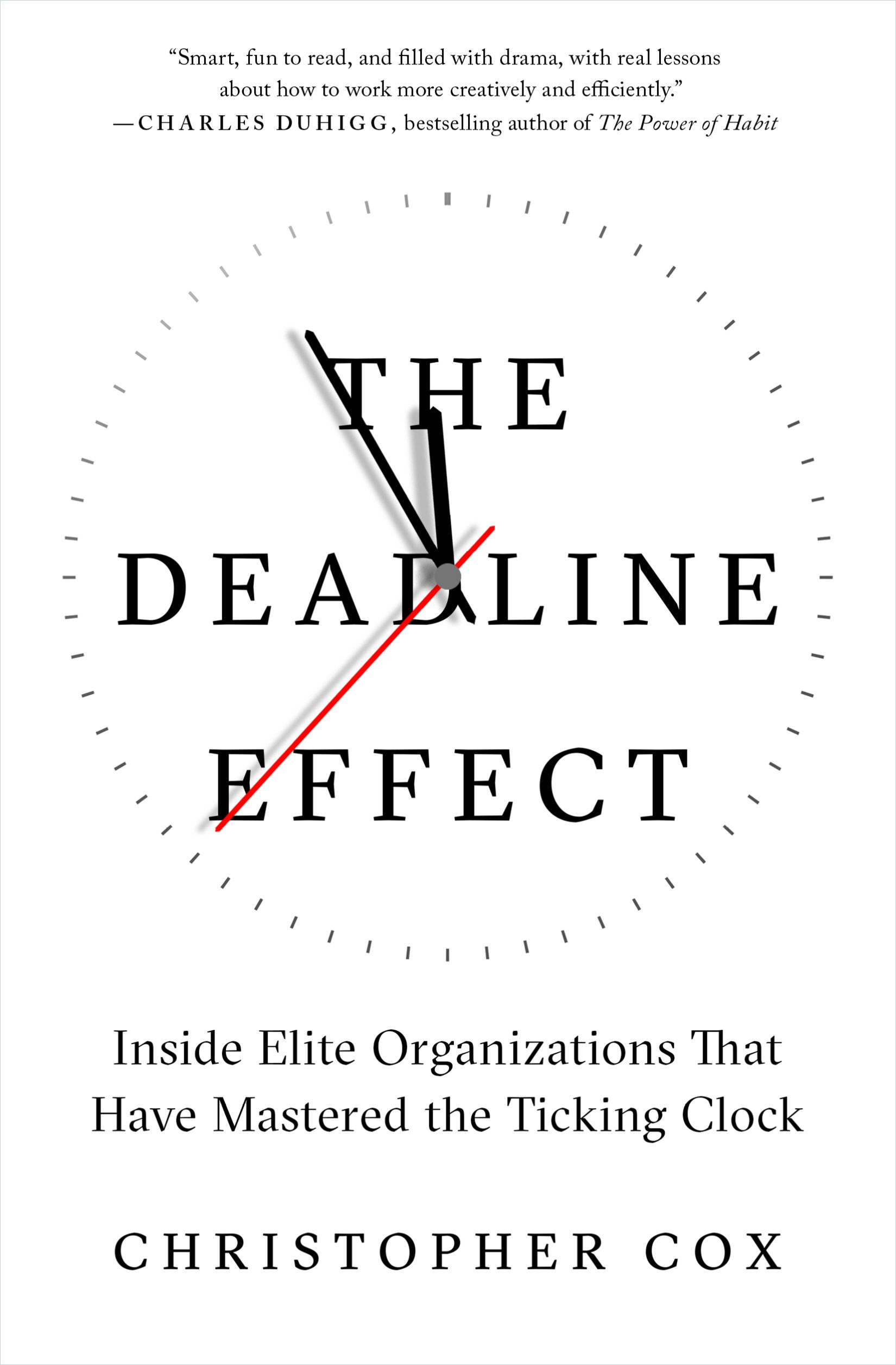Former Harper’s and GQ editor Christopher Cox offers an in-depth exploration of how various industries deal effectively with deadlines.

How to Meet Your Deadlines
Christopher Cox, a former chief editor of Harper’s and executive editor of GQ, argues that deadlines can be powerful motivators. But when facing a deadline, people tend to postpone work until the last minute. This is the essence of the deadline effect. Cox, no stranger to deadlines, observes how many organizations across diverse industries have learned to sidestep the deadline effect to reach their goals on time without panicking or sacrificing quality. These organizations view deadlines as a motivational tool and stick to a timetable without cutting corners. Cox’s fresh, eloquent analysis – teeming with colorful case studies – teaches you to leverage deadlines to your advantage.
The good news is that we have already come up with an incredibly effective structure to solve the problem of our weak wills – it is the deadline.Christopher Cox
The Wall Street Journal wrote, “The good news…is that we can make deadlines work for us instead of the other way around,” and the Financial Times found that, “Cox intertwines behavioral science, psychological theory, and academic studies with compelling storytelling and descriptive case studies.”
Deadlines
As executive editor of GQ, Christopher Cox assigned a cover story on rapper Puff Daddy to John, a talented writer notorious for missing deadlines. GQ promoted the interview, so John’s article had to appear in the April edition. Cox told John the final deadline was a week prior to the actual due date. Predictably, John submitted his piece moments before what he believed was the deadline. This opened Cox’s eyes to the persuasive power of early deadlines.
Plan Backward
Cox traveled to Smith River, California, to study four farms that produce the entire annual commercial supply of Easter lilies – 10 million bulbs – for the United States and Canada. But Easter is a lunar holiday and falls on a different date each year. So how do the farmers manage to have flowers in full bloom by Easter?
The planning fallacy is the tendency to seize upon the most optimistic timetable for completing a project and ignore any information that might make you revise that prediction.Christopher Cox
Cox discovered that they count backward from the Easter Sunday deadline. Bulbs need upward of 110 days in a greenhouse to bloom. So farmers harvest, sort, pack and ship the bulbs somewhere between, the author learned, early and late October. Planning backward helps fight the tendency to underestimate a project’s time and cost.
Soft deadlines
Telluride Ski Mountain traditionally opens for business on Thanksgiving weekend. In 2018, however, just a week before the scheduled opening, the ski runs were still mostly brown. Cox traveled to the Colorado mountain resort to observe how it coped with the pressure of a looming deadline.
Though Telluride’s management was determined to open on time, Thanksgiving was actually a soft deadline. What really mattered was the week after Christmas: the period when the resort generates 20% of its seasonal revenue. In 2018, Telluride intended on having two runs open on Thanksgiving. Cox discovered that the resort needed 200 hours of cold nightly temperatures in the run-up to Thanksgiving to meet the soft deadline. If it’s cold enough, snow machines can turn 5,000 gallons, or almost 23,000 liters, of water into snow hourly. Each night the temperature dropped below freezing, the team directed water from two reservoirs to the resorts snow guns. Refilling the reservoirs takes five times longer than emptying them, so laying down enough snow was a race to the deadline. The long shift work paid off. At 10 a.m. on Thanksgiving morning, Cox witnessed the opening of the lifts. The Thanksgiving deadline wasn’t crucial, but meeting it sent a message to holidaymakers that the resort would be ready for Christmas.
Meticulous Planning
Black Friday is a retail owner’s nightmare, yet year-on-year, Best Buy avoids the mayhem of Black Friday’s desperate shoppers. How? Cox went undercover as an employee at the home theater department of a Best Buy to find out.
Two weeks prior to Black Friday the store prepped its workers. Management divided the sales floor into five discrete departments – home theater, computing, gaming, cellphones and appliances – each with its own checkout area. The store hired additional security and management gave the store a $725,000 sales target. For each item employees sold on Black Friday, the entire team would receive credit to encourage collaboration and speed rather than competition.
With Cox working the sales floor, the Black Friday sale began at 5 p.m. on Thanksgiving and customers packed the store until 1 a.m. Thanks to the store’s planning, the crowd never became unwieldy or out of control except in the parking lot, where customers fought over spaces and triple-parked to load their purchases.
The Antidote
Cox studied the 621st Contingency Response Wing of the Air Force at McGuire Air Force Base in New Jersey, which is always prepared to tackle a catastrophe. He discovered that the base boasts a huge warehouse containing all-terrain vehicles and pallets loaded with emergency response essentials – tents, heaters, generators, fuel, water and other supplies – which always stands at the ready. When a hurricane makes landfall and the Pentagon calls on the troops to act, the work is all a matter of routine for the airmen, who perform simulations throughout the year in preparation for the real thing.
If you think you may be called to show your cards at any moment, you’re more likely to always be holding a strong hand.Christopher Cox
Yet it’s not the prep work that keeps the deadline effect at bay for the Air Force. According to economist Muhamet Yildiz, a deadline that depends upon a random, uncontrollable event that could strike at any time is the most powerful antidote to the deadline effect. If you know a critical deadline could arise at any moment, claims Cox, you want the comfort of knowing you’re in a strong position.
Wit and Thought
Cox – whose editing of in-depth think pieces for Harper’s and of witty, observational articles for GQ – finds expression in his unique voice, which showcases the best of both. Cox provides useful, evocative detail while deploying his cheeky sense of humor. Cox always finds the practical, self-help lessons in each of his compelling examples. He offers worthy advice obliquely while providing compelling, memorable reading.





